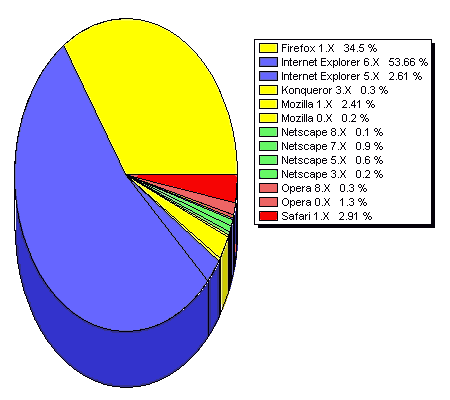Browser Market Share? Depends on Who You Ask
I have been a marketer for almost 20 years, and one of the classic mistakes in marketing is to rely too much on your own experience and preferences. Its often easy to fall into the trap of saying "everyone I know would like that" or vice versa, only to find that "everyone you know" are not necessarily representative of the market as a whole.
When I was a consultant at McKinsey & Co., we often asked people we were interviewing questions like "what is the market size for window glass in Mexico". The key to successfully completing the exercise was to break the problem down into cascading assumptions, each of which could theoretically be researched and checked. For example, with the window glass problem, a good answer might be:
The glass market is probably made up of housing, commercial buildings, automotive, and other. Take the housing market. Assume 80% of the market is new construction. Assume the population of Mexico is 50 million, and there are 5 people per home, so there are 10 million homes, and lets assume the housing stock is increased by 5 % a year and that each home has 100 square feet of glass.. etc etc.
It was kind of fun to see if they get to the right answer, but the whole point was to see how they could break down and analytical problem. The reason I bring up this whole episode was sometimes we would ask our recruits, typically Ivy Leaguers, to come up with the market size for annual snow ski sales. So they would work through the logic that there are 300 million people in the US and x% ski and these people replace their skis on average every 5 years, etc. However, it always made me laugh that these folks would be guaranteed to miss the number way, way high. Why? Because in coming up with the percentage of people that ski, they would look around the room and say, well 80% of my friends ski and so lets assume 30 or 40 or even more percent of Americans snow ski. In fact, I have not looked up the number lately, but the actual percentage of Americans that ski is something less than 5%. Recruits intuition was fooled because, at least in terms of skiing, they were surrounded by an anomalous population.
All of this is a long, long, overly long intro into an interesting set of facts around browser share between IE and Firefox. A while back I wrote that, from my traffic logs for this site, Firefox appears to be killing IE. In fact, since I posted this, Firefox has gained even more share on this site:
Now, to the issue of this post, one might suspect that my traffic might not be representative of the whole market. I would argue that blog readers probably are heavier Internet users, more Internet-savvy on average, and therefore more likely to have investigated browser alternatives beyond the one pre-loaded on their PC. It turns out that I have a way to test this. I have another group of sites for my business, including sites for Forest Service Campgrounds, Lake Havasu Jetski Rentals, and Campground Jobs. The readers of these sites tend to be older on average and less computer proficient. The browser market share at these sites looks like this:
Wow, that is a huge difference. Take it from me, its unusual to find a market segmentation that dramatic. It makes me wonder about all of the talk about blogs replacing the MSM. How much are we breathing our own exhaust?
Postscript: This is an age-old problem and takes many forms in many businesses. For example, thousands of farmers have bankrupted themselves in the commodities futures markets making bets on worldwide crop prices based on their local weather and harvest expectations.
Disclosure: Yes, I did take the opportunity to shamelessly Google bomb my own sites. Sorry. I don't do it very often, maintaining a pretty solid firewall between my business and blog.


Today's lesson in market sizing is brought to you by the letter Tee
After discovering that there are more than 180 different kinds of tees available to the average consumer, I was left wondering just who it is that actually buys all these tees and how there can possibly be a big eneough market to support all of these v...
Business Idea Assessment, Part 1: Demand
The first criterion of the analytical framework is demand. Even the most sophisticated data model is useless when your financial inputs are ficti...